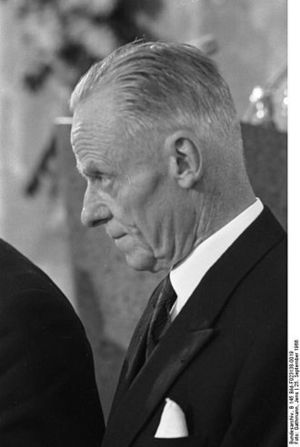Willem A. Visser 't Hooft
( theologian) | |
|---|---|
 In 1966 | |
| Born | 20 September 1900 Haarlem, Netherlands |
| Died | 4 July 1985 (Age 84) |
| Nationality | Dutch |
| Alma mater | University of Leiden |
| Religion | Protestant |
Dutch theologian who became the first secretary general of the World Council of Churches. Informant for Allen Dulles during WW2. Single Bilderberger.
| |
Willem Adolf Visser 't Hooft was a Dutch theologian who was Secretary-General of the World Council of Churches for almost 20 years,[1] where he had extensive contacts to the countries in the Eastern Bloc. He attended the 1968 Bilderberg meeting, where one of the subjects was that the relations between the West and the Communist Countries was "characterized by the development of limited but important elements of co-operation along with the persistence of overriding conflict."
He was an informant for Allen Dulles in Switzerland duding World War 2, where he had extensive contacts to the German underground opposition.
Contents
Background and education
He was born into the patrician 't Hooft family. He studied theology at the University of Leiden. At the urging of his father, who was a lawyer, he studied law in addition to theology from 1918 to 1920. In the theological field, he was influenced by the influential Swiss theologian Karl Barth. On 18 December 1923 Visser 't Hooft passed the doctoral examination in theology.[2]
During his studies he held various board positions in the Nederlandsche Christen-Studenten Vereeniging (NCSV), and was a delegate to conferences abroad. In 1936 Visser 't Hooft was confirmed as pastor of the Église Nationale Protestante in Geneva, Switzerland.
World War 2
During the Second World War, Visser 't Hooft managed to maintain contacts between churches established in the various belligerent countries from neutral Switzerland, including from Germans opposed to Hitler, like Adam von Trott zu Solz and the Kreisau Circel. He contributed to the secret message traffic between the resistance in the Netherlands, Queen Wilhelmina and the government in exile in London and offered help to people who had fled Nazi Germany. He was the end point of the message line of the Underground network Netherlands-Paris, also called the Swiss Road.[3]
He was also an informant for spymaster Allen Dulles in Geneva.[4]
World Council of Churches
In 1938, in Utrecht, he was appointed despite his young age to the post of secretary general of the Provisional Committee of the World Council of Churches (WCC) which was being created. The Second World War delayed the work of the WCC provisional committee and it was not until 1948 that the first WCC Assembly took place in Amsterdam.[5][6]
The WCC was the most important embodiment of the twentieth-century ecumenical movement. Its founding assembly, which brought representatives of 147 different churches from forty-four countries together in Amsterdam from 22 August to 4 September 1948, included leading Christian thinkers, clergy, and laypeople, such as John Foster Dulles, Karl Barth, and Martin Niemöller.[7]
Visser ‘t Hooft, in collaboration with American church leaders,succeeded in binding German Protestantism to the ecumenical movement through a combination of material support, consistent lobbying that the Confessing Church had resisted Hitler from the onset and claiming that Christianity would prevent future totalitarian movements. By thus binding German Protestants, ecumenists "both obfuscated and tempered the nationalistic and anti-democratic ideals commonly held by leading members of the German Protestant Church while also rehabilitating their conservative political values to make them more palatable in a post-Nazi Germany."[8]
He also early supported some sort of European federation "that bound together its disparate and warring nation-states".[9]
The founding of the WCC coincided with the onset of the Cold War. As the central hub in a sprawling, worldwide network with a constituency of many dozens of millions of believers, the Geneva-based organisation possessed greater clout than many secular organisations in disseminating ideas about human rights and exerted influence on international institutions, states, civil society, and public debate.[7]
Visser 't Hooft oversaw the joining of the Russian Orthodox Church to the WCC. WCC conferences and several Orthodox joined the organisation's staff in Geneva. A number of visits and countervisits were organised, notably including a 1964 visit to the WCC by Patriarch Alexi. Transnational contacts also intensified more generally: national ecclesiastical organisations had begun undertaking exchange visits to the Soviet Union, which grew more frequent in the ensuing decades.[7]
Event Participated in
| Event | Start | End | Location(s) | Description |
|---|---|---|---|---|
| Bilderberg/1968 | 26 April 1968 | 28 April 1968 | Canada Mont Tremblant | The 17th Bilderberg and the 2nd in Canada |
References
- ↑ http://www.wcc-coe.org/wcc/news/press/00/visser-bio.html
- ↑ https://www.oikoumene.org/sites/default/files/File/Visser%27t-Hooft_1900-1985_Full_Text.pdf
- ↑ https://nl.wikipedia.org/wiki/Zwitserse_Weg
- ↑ https://erenow.org/ww/spy-heart-third-reich-extraordinary-story-fritz-kolbe/6.php
- ↑ https://hls-dhs-dss.ch/fr/articles/011332/2011-08-31/
- ↑ https://resources.huygens.knaw.nl/bwn1880-2000/lemmata/bwn4/hooft
- ↑ Jump up to: a b c https://www.cambridge.org/core/journals/contemporary-european-history/article/between-dialogue-and-denunciation-the-world-council-of-churches-religious-freedom-and-human-rights-during-the-cold-war/21D129EDA6DF116383A98A3C2377F964
- ↑ https://academicworks.cuny.edu/cgi/viewcontent.cgi?article=3779&context=gc_etds
- ↑ https://academicworks.cuny.edu/cgi/viewcontent.cgi?article=3779&context=gc_etds